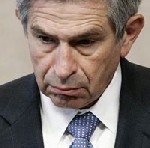 Almotamar.net Google Economy
Almotamar.net Google Economy - The long-expected departure of Paul Wolfowitz as head of the world's most important anti-poverty organization drew much closer yesterday, when the embattled World Bank president gave up his fight to stay on, and began negotiating the terms of his resignation.
The Iraq-war proponent who was appointed to this hugely important post for the wrong reasons � the United States, by tradition, appoints the World Bank president, and U.S. President George W. Bush was looking for a post-Pentagon sinecure for "Wolfie" � will now similarly leave the job for the wrong reason.
Wolfowitz lost the confidence of the bank's board because of the so-called "Riza affair," the incoming president's secret negotiations to have his girlfriend and fellow bank employee Shaha Ali Riza transferred to the U.S. State Department with a pay raise from $133,000 (U.S.) to an astonishing $193,500 (U.S.), all tax-free � a sum higher than the salary of U.S. Secretary of State Condoleezza Rice, Riza's ostensible boss.
That sweetheart deal (pun intended) is reason enough for Wolfowitz to go. The hypocrisy of it stank to high heaven, given that Wolfowitz's self-selected mandate at the bank was to preach transparency and anti-corruption among World Bank recipient nations.
But the Riza affair that has dominated media coverage of upheaval at the World Bank is not the compelling reason why it needs to remove Wolfowitz. Even in pleading his case with the 24-member bank board in a private session Tuesday, Wolfowitz conceded that "I relied much too long on advisers" whom he recruited from the White House and the Pentagon, from which he had just arrived as former U.S. deputy defence secretary.
These factotums isolated Wolfowitz even from senior World Bank executives who develop and oversee bank programs, and arbitrarily intervened to cancel programs � despite their lack of experience in international finance and development.
The anti-corruption initiative Wolfowitz inherited from predecessor James Wolfensohn and greatly amplified, was noble on its face, but oddly directed under Wolfowitz mainly at countries deemed unfriendly to the United States.
In a Toronto Star analysis of the Wolfowitz saga last month, the chronic credibility issues at both institutions were described as arising from the tradition of U.S. appointment of the World Bank head and European selection of the IMF chief.
Last week, Joseph Stiglitz, former World Bank chief economist and Nobel Prize winner for economics, argued in an essay in the Financial Times of London that Wolfowitz's moral standing was undercut from the start because the development and finance ministers of the bank's 185-plus member nations, who should have been closely involved in his appointment, "were left to ratify what was essentially a done deal."
Noting the recent decision of some Latin American nations to cut their ties to both the World Bank and the IMF, former Indian economic affairs secretary E.A.S. Sarma added last week that "the developing countries should have adequate voice in determining the policies within the bank and the IMF."
Rumours abound that Bush would like to select as Wolfowitz's replacement Bush's Iraq comrade-in-arms Tony Blair, the British prime minister who plans to step down at the end of June. That would be a break with the tradition of U.S. citizens who've run the bank, but a non-starter since Blair is almost as radioactive with the bank's board as Wolfowitz became.
Better candidates include Kemal Dervis, who as Turkish finance minister effectively steered his country through a period of financial crisis, and has held senior developing-world assistance posts at the World Bank and United Nations. And Arminio Fraga, who gained similar global plaudits running Brazil's central bank. Either appointment would unleash all manner of overdue reforms at an institution badly in need of re-examining its mandate 53 years after its founding.

